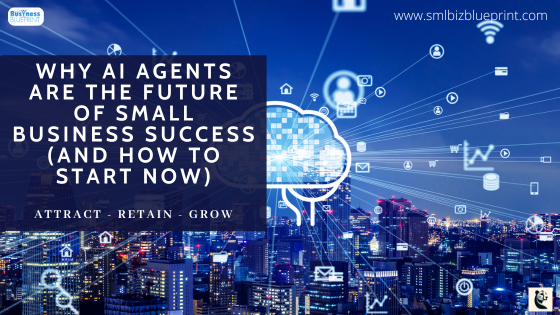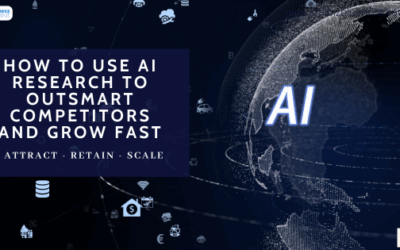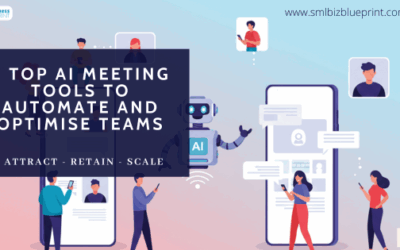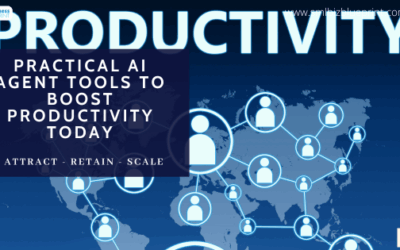AI is no longer just a buzzword—it’s a game-changer for small businesses looking to compete in an increasingly digital world.
Yet many small business owners struggle with repetitive tasks, rising operational costs, and the challenge of delivering personalised customer experiences. AI agents step in, offering a cost-effective, scalable, and surprisingly accessible remedy.
According to a study by PwC, businesses adopting AI technology can reduce operational costs by up to 30% while improving productivity.
Imagine freeing up time to focus on growing your business while an AI agent handles customer inquiries, manages your schedule, or even forecasts sales trends—all automatically.
This post will explore how AI agents can transform your small business. By the end, you’ll discover what AI agents are and how they can revolutionise your business processes, giving you the tools to stay ahead in today’s competitive market.
Let’s dive in!

#1 What Are AI Agents? Understanding the Basics
AI agents are more than just a futuristic concept—they’re practical, real-world tools reshaping how businesses operate. At their core, AI agents are software systems designed to perform specific tasks autonomously, learning from data and adapting over time.
Think of them as digital employees capable of working tirelessly around the clock to streamline your operations.
Unlike traditional software, AI agents don’t require constant input from a human. Instead, they use machine learning algorithms and natural language processing (NLP) to analyse data, make decisions, and even interact with customers.
For example, an AI-powered chatbot can handle customer inquiries, while a recommendation engine can suggest products based on browsing history—all without human intervention.
AI agents typically fall into three categories:
Reactive Agents: Respond to specific stimuli (e.g., answering FAQs via a chatbot).
Decision-Making Agents: Analyze data to make predictions or recommendations (e.g., inventory management tools).
Learning Agents: Continuously improve their processes by analysing feedback and outcomes (e.g., marketing optimisation tools).
Whether automating repetitive tasks, analysing complex datasets, or providing personalised customer interactions, AI agents are designed to save time, reduce errors, and drive efficiency.
According to Salesforce, 80% of customers now expect companies to provide personalized interactions, and AI agents are the key to efficiently meeting these expectations.
Actions
- Identify Pain Points: Determine which repetitive or time-consuming tasks in your business, such as customer inquiries or inventory tracking, could be handled by an AI agent.
- Start Small: Create a single AI tool—like a chatbot—to address a specific need and evaluate its performance before scaling.
- Choose the Right Platform: Look for tools that integrate seamlessly with your existing systems, such as HubSpot for customer service or ChatGPT for content creation.
By understanding the basics and taking these small steps, you can leverage AI agents to revolutionise your business.
#2 The Different Types of AI Agents and Their Role in Small Businesses
AI agents come in various forms, each designed to perform specific tasks that can enhance small businesses’ operations.
Understanding the different types of AI agents is crucial to determining which ones benefit your business needs.
Reactive Agents
Reactive agents are the simplest form of AI. They operate based on pre-programmed rules and respond to specific inputs without learning from past interactions.
For example:
Chatbots: Answer frequently asked questions or assist with customer inquiries.
Virtual Assistants: Help schedule appointments or manage calendars.
While reactive agents are not adaptive, they’re perfect for straightforward tasks like answering common queries or automating repetitive actions.
Decision-Making Agents
Decision-making agents analyse data and provide actionable insights or predictions, helping small businesses make informed decisions.
Examples include:
Inventory Management Tools: Predict stock requirements based on past sales trends.
Customer Segmentation Tools: Identify key customer groups for targeted marketing campaigns.
These agents are ideal for businesses looking to streamline complex processes and reduce inefficiencies.
Learning Agents
Learning agents go further by using machine learning algorithms to improve over time. They analyse feedback from their tasks to refine their decision-making abilities.
Examples include:
Marketing Optimization Tools: Automatically adjust ad campaigns to maximise ROI.
Customer Recommendation Systems: Suggest products based on real-time user behaviour.
Learning agents are beneficial for businesses seeking growth through continuous improvement and personalisation.
Why These Agents Matter for Small Businesses
By combining these types of agents, small businesses can automate basic tasks, gain insights for decision-making, and continually refine operations.
For instance, a clothing retailer might use a chatbot for customer service (reactive), an inventory tool for managing stock (decision-making), and a recommendation engine to drive sales (learning).
Actions
- Mix and Match AI Agents: Combine reactive, decision-making, and learning agents to cover various business functions, from customer support to data analysis.
- Integrate with Existing Systems: Choose AI tools that can seamlessly connect with platforms you already use, such as CRM or inventory management software.
- Set Clear Goals: Define what you want each AI agent to achieve, such as reducing response time by 30% or increasing inventory turnover.
Small businesses can achieve both efficiency and scalability with the right mix of AI agents.
Ready to Boost Your Business Knowledge?
Sign up for our newsletter to get the latest AI, automation, and marketing trends every month.
#3 How AI Agents Can Transform Your Small Business Operations
Small businesses often need more resources, making efficiency and scalability top priorities.
AI agents offer a transformative solution by automating tasks, optimising operations, and enabling personalised customer experiences. Here’s how they can make a significant impact:
Increase Operational Efficiency
AI agents streamline workflows by taking over repetitive and time-consuming tasks. This allows your team to focus on strategic initiatives rather than manual processes.
Examples include:
AI-powered scheduling tools: Automate appointments and meetings.
Data entry automation: Reduce errors and save time.
By reducing human intervention in routine activities, AI agents enhance productivity and minimise costly mistakes.
Improve Customer Retention with Personalization
Today’s customers expect personalised interactions, and AI agents excel at meeting those expectations. They analyse customer behaviour and preferences to deliver tailored recommendations, messages, or solutions.
Examples:
Chatbots: Provide instant support with context-aware responses.
Recommendation engines: Suggest products based on browsing and purchase history.
This level of personalisation fosters trust and loyalty, ensuring customers keep coming back.
Enable Data-Driven Decision Making
AI agents can analyse vast amounts of data to identify trends, patterns, and actionable insights. This empowers small businesses to make smarter, data-backed decisions.
Examples include:
Predicting sales trends to manage inventory.
Identifying customer segments for targeted marketing.
AI agents don’t just provide insights—they also recommend strategies to improve outcomes.
Actions
- Identify High-Impact Areas: Focus on tasks that consume significant time or have a high error rate, such as inventory management or customer service.
- Choose Scalable Tools: Start with user-friendly platforms like ChatGPT or HubSpot, which are easy to integrate and grow with your business.
- Measure Success: Set KPIs for your AI agents, such as response times, sales conversions, or cost reductions, to evaluate their impact on your operations.
By strategically integrating AI agents into its operations, your small business can achieve efficiency, scalability, and enhanced customer satisfaction.
#4 Boosting Customer Service with AI-Powered Agents
Customer service is the cornerstone of a successful small business, yet it’s often one of the most resource-intensive areas to manage.
AI-powered agents deliver a solution by delivering fast, personalised, consistent support that meets modern customer expectations. From 24/7 availability to proactive engagement, these tools transform how small businesses interact with customers.
24/7 Availability for Instant Support
AI agents like chatbots ensure your customers are never left waiting. Whether it’s answering frequently asked questions or processing returns, AI agents provide real-time responses, even outside regular business hours.
This improves customer satisfaction and reduces the workload for your human team.
Example: An AI chatbot can handle common inquiries like “What are your store hours?” or “Where’s my order?”—freeing up staff to focus on complex issues.
Personalised Customer Interactions
AI agents analyse past customer behaviour and preferences to offer tailored recommendations and responses. This creates a personalised experience that builds trust and loyalty.
For example:
Recommending complementary products based on purchase history.
Offering customised discounts for returning customers.
By mimicking human-like interactions, AI-powered agents can make customers feel valued and understood.
Proactive Problem-Solving
AI agents excel at analysing customer data to identify potential issues before they arise. For example, they can:
Notify customers of delivery delays and offer alternative solutions.
Flag unusual account activity and suggest immediate action.
This proactive approach resolves problems faster and enhances customer confidence in your brand.
Actions
- Start with FAQs: Deploy an AI chatbot to handle common questions and gradually expand its capabilities to address more complex issues.
- Integrate with CRM Systems: Use AI agents that connect with your CRM to access customer data and provide more personalised service.
- Monitor Performance: Regularly review AI agent interactions to identify areas for improvement and ensure they align with your brand voice.
Integrating AI agents into your customer service strategy can provide faster, smarter, and more personalised support—boosting customer satisfaction and retention.

#5 Automating Repetitive Tasks: Save Time and Focus on Growth
Repetitive tasks often consume valuable time and resources that small businesses could better allocate toward growth and innovation. AI agents excel at automating these time-consuming processes, freeing up your team to focus on strategic priorities.
From managing schedules to processing data, AI can handle routine activities quickly, accurately, and consistently.
Streamlining Administrative Tasks
Administrative work such as scheduling meetings, data entry, or responding to emails can bog down productivity. AI agents can automate these tasks to ensure smooth operations without constant human intervention.
Example: An AI-powered tool can schedule appointments by syncing calendars, sending reminders, and rescheduling when conflicts arise.
Optimising Financial Processes
AI agents are transforming small business finances by automating tasks like expense tracking, invoice processing, and payroll management.
Example: AI tools can analyse receipts, auto-generate reports, and flag irregularities, making bookkeeping faster and more accurate.
Simplifying Marketing Automation
Marketing efforts often involve repetitive activities such as email campaigns, social media posting, and ad optimisation. AI agents can take over these tasks, ensuring consistency and maximising reach.
Example: AI tools can create personalised email sequences, schedule social media posts, and adjust ad spend based on performance.
Small businesses can save significant time, reduce errors, and boost overall efficiency by automating these processes.
Actions
- Identify Time-Draining Tasks: Start by listing repetitive tasks that take up the most time, such as data entry or social media scheduling, and prioritise automating them.
- Choose the Right Tools: Use AI platforms like Zapier for workflow automation, QuickBooks for financial management, or Buffer for social media posting.
- Monitor and Refine: Regularly review automated workflows to ensure they meet your objectives and adjust as needed.
Automating repetitive tasks allows your small business to operate more efficiently, save costs, and focus on scaling and innovation.
#6 How to Start Using AI Agents in Your Small Business
Adopting AI agents for your small business can feel overwhelming, but starting small and taking a step-by-step approach is key. AI agents are powerful tools that can transform your operations, but their effectiveness depends on implementing them thoughtfully.
Focusing on areas where AI can make an immediate impact can help ease the transition quickly and produce measurable results.
Identify Key Pain Points in Your Business
The first step is to assess your current challenges and bottlenecks. Look for repetitive tasks, areas prone to errors, or processes that require significant time and resources.
For example:
Customer Service: Are inquiries overwhelming your team?
Marketing: Are campaigns inconsistent or poorly targeted?
Data Analysis: Are you struggling to make sense of your business data?
You can target areas where AI agents can deliver the most value by identifying specific pain points.
Research and Select the Right AI Tools
Not all AI tools are created equal, so choosing platforms that align with your goals is crucial.
Consider:
Ease of Integration: Does the tool work seamlessly with your existing software?
Scalability: Can the tool grow with your business?
Cost-Effectiveness: Does it fit within your budget?
Start Small and Scale Gradually
Rather than implementing multiple AI agents at once, begin with a single solution that addresses a critical area of your business.
Monitor its performance and ROI before expanding to other use cases.
For instance, deploy a chatbot for customer service and evaluate how it reduces response times and improves customer satisfaction.
Once you see the benefits, you can introduce AI agents in other areas, such as inventory management or sales forecasting.
Actions
- Define Success Metrics: Establish clear KPIs (e.g., reduced response time and increased sales) to measure the impact of AI agents.
- Train Your Team: Provide adequate training to ensure employees know how to work alongside AI agents effectively.
- Leverage Free Trials: Many AI tools offer trial periods, so use them to test functionality and fit before committing.
Starting small and focusing on strategic areas can help your small business unlock the full potential of AI agents without unnecessary risk or complexity.
Subscribe to Pulse for Just $7/Month and Start Boosting Your Digital Marketing Today!
Subscribe Now
Sign up now to access expert insights and strategies that will help your business grow.
Don’t miss out on the chance to stay ahead in the ever-evolving digital marketing landscape.
#7 The ROI of AI Agents: Cost vs. Benefits for Small Business Owners
Initially, investing in AI agents may seem like a significant expense, but the long-term return on investment (ROI) often outweighs the initial cost.
From reducing operational expenses to increasing revenue, AI agents can provide small businesses with measurable financial and productivity gains.
Reduced Operational Costs
AI agents can take over repetitive and time-intensive tasks, minimising the need for manual labour and reducing overhead costs.
For example:
Automating customer support with chatbots reduces the need to hire additional staff.
AI tools for data entry and reporting eliminate errors that could lead to costly mistakes.
By streamlining these processes, small businesses can save thousands of dollars annually.
Increased Revenue Through Efficiency
AI agents enhance productivity by enabling businesses to do more with fewer resources.
Examples include:
Personalised Marketing: AI-driven email campaigns improve conversion rates by targeting the right audience with tailored messaging.
Faster Response Times: AI-powered customer service ensures no opportunity is missed, leading to better customer retention and increased sales.
These efficiencies lead to higher revenue without significant increases in operational complexity.
Long-Term Scalability
One of the most significant benefits of AI agents is their ability to scale with your business. AI agents can handle increased workloads with minimal additional costs, unlike hiring additional staff or purchasing physical equipment.
For instance, an AI tool managing inventory can scale as your business grows, ensuring stock levels are optimised for new demand.
Actions:
- Start with High-Impact Areas: Implement AI agents in processes where they can provide immediate cost savings or revenue increases, such as customer support or sales.
- Monitor Performance Metrics: Use KPIs like cost savings, increased sales, or reduced response times to track the financial impact of AI tools.
- Reinvest Savings: Redirect the resources saved through AI efficiencies into growth initiatives, such as marketing or product development.
Small businesses can turn AI agents into a powerful tool for sustained profitability and growth by focusing on ROI and scaling strategically.
#8 Key Steps for Choosing the Right AI Tools for Your Business
Selecting the right AI tools is crucial for maximising efficiency and ensuring your business gets the most out of automation. With so many options available, the process can feel overwhelming.
However, following a strategic approach, you can choose AI tools that align with your business needs, goals, and budget.
Identify Your Business Needs and Goals
Before selecting an AI tool, it’s important to understand the specific problems you’re trying to solve or the goals you want to achieve. Are you looking to automate customer service, optimise marketing campaigns, or streamline inventory management?
By defining clear objectives, you can narrow the options to tools that address your needs.
Evaluate the Tool’s Compatibility with Your Existing Systems
One of the most important factors in choosing AI tools is how well they integrate with your current software and systems. Look for platforms that seamlessly integrate your CRM, email marketing software, or accounting tools.
This will save you time and resources during the implementation process and reduce the risk of disrupting your existing operations.
Consider Scalability and Flexibility
As your business grows, so should your tools. Choose AI platforms that offer scalability, meaning they can handle increased demand as your business expands. Look for tools that offer customisation options or additional features you can activate as your needs evolve.
This will help ensure the tool remains valuable and relevant for years.
Look for User-Friendliness and Support
AI tools should be easy to use. Look for platforms with intuitive interfaces that don’t require extensive technical expertise.
Additionally, ensure the provider offers customer support, training, and resources to help your team get the most out of the tool.
Compare Pricing and ROI
AI tools come in various price points, from affordable freemium options to more advanced enterprise-level solutions. Make sure to consider your budget and choose tools that provide a good return on investment.
Many AI tools offer free trials or tiered pricing models, so take advantage of these to assess the value they provide before committing.
Actions
- Start Small: Begin with one AI tool that addresses an immediate need, such as a chatbot for customer support or an email automation tool.
- Leverage Reviews and Case Studies: Look for reviews from businesses similar to yours and explore case studies to understand how the tool has benefited others.
- Test with a Free Trial: Many AI tools offer a free trial period—use this to get a feel for the tool and ensure it fits your needs before committing.
By following these steps, you can make informed decisions when selecting AI tools for your business, ensuring they contribute to your long-term growth and success.
#9 Overcoming Challenges: Tips for Seamlessly Adopting AI Agents
While the benefits of AI agents are undeniable, adopting them can present challenges for small businesses. From cost concerns to employee resistance, these hurdles can slow down implementation.
However, with the right strategies, you can overcome these obstacles and integrate AI agents smoothly into your business operations.
Addressing Cost Concerns
Many small business owners worry about the upfront costs of AI tools. The key is to focus on solutions that provide high ROI and offer scalable pricing.
Solution: Start with affordable or freemium AI platforms that address immediate pain points, such as customer service or marketing automation.
Example: Tools like ChatGPT and Zapier offer low-cost entry points with significant potential savings.
Managing Employee Resistance
Introducing AI tools can raise concerns among employees about job security or changes to their workflow. It’s crucial to communicate how AI will complement their work rather than replace it.
Solution: Provide training to help employees effectively understand and work with AI agents.
Example: Show how AI can handle repetitive tasks, allowing employees to focus on strategic and creative initiatives.
Ensuring Data Privacy and Compliance
AI tools often rely on sensitive customer and business data. Small businesses must prioritise secure tools and comply with data protection regulations like GDPR or CCPA.
Solution: Choose AI platforms with built-in compliance features and educate your team about best practices for data handling.
Example: Platforms like HubSpot and QuickBooks emphasise data security and provide tools to manage privacy concerns.
Actions
- Start Small and Scale Gradually: Begin with a single AI tool that addresses a critical pain point, then expand as you see results.
- Foster Employee Buy-In: Involve your team early by showing how AI will support their roles and enhance efficiency.
- Prioritise Security: Work with AI vendors that offer secure systems and data compliance support to avoid risks.
By addressing these challenges proactively, your small business can confidently integrate AI agents and unlock their full potential for growth and efficiency.
Conclusion
AI agents are no longer just a futuristic concept—they are practical tools transforming how small businesses operate. From automating repetitive tasks to enhancing customer service and enabling data-driven decisions, these agents empower small business owners to do more with less.
By thoughtfully integrating AI agents, you can improve efficiency, boost customer satisfaction, and set your business on a path to scalable growth.
To recap, we’ve explored:
- What AI agents are and their types: Understanding reactive, decision-making, and learning agents.
- The transformative benefits: Automating tasks, personalising customer interactions, and enabling smarter operations.
- Real-world applications and tools: From chatbots to inventory managers, AI solutions are already helping small businesses thrive.
- Practical steps to get started: Identifying pain points, starting small, and choosing the right AI tools for your business.
Now is the perfect time to take the first step in leveraging AI for your small business. Start by evaluating which processes could benefit most from automation and exploring affordable tools that align with your goals.
Let AI agents handle the heavy lifting while you focus on growing your business to new heights.
FAQs
Q1: What are AI agents, and how do they work?
A1: AI agents are software systems designed to perform specific tasks autonomously. They use technologies like machine learning and natural language processing (NLP) to analyse data, make decisions, and interact with users. These tools can automate repetitive tasks, enhance customer service, and improve operational efficiency.
Q2: How can AI agents benefit small businesses?
A2: AI agents help small businesses save time and money by automating tasks like customer support, marketing, and data analysis. They also improve customer satisfaction through personalised interactions and enable better decision-making with data-driven insights.
Q3: Are AI agents expensive to implement?
A3: The cost of implementing AI agents depends on the tools and platforms chosen. Many affordable or freemium AI tools are available, making it possible for small businesses to get started without significant upfront investment. Examples include ChatGPT, HubSpot, and QuickBooks.
Q4: Which areas of my business can benefit most from AI agents?
A4: Common areas where AI agents can add value include:
Customer Service: Chatbots and virtual assistants.
Marketing: Personalized email campaigns and social media scheduling.
Operations: Inventory management and workflow automation.
Q5: What challenges might I face when adopting AI agents?
A5: Common challenges include cost concerns, employee resistance, and data privacy issues. These can be addressed by starting with affordable tools, providing training for staff, and ensuring AI platforms meet compliance standards for data protection.
Q6: What are some popular AI tools for small businesses?
A6: Some top AI platforms include:
ChatGPT: Customer support and content creation.
HubSpot: Marketing automation and CRM integration.
QuickBooks: Financial management and invoicing.
Zapier: Workflow automation and app integration.
Q7: How can I measure the ROI of AI agents?
A7: Track key performance indicators (KPIs) like:
Time saved: Measure reductions in time spent on repetitive tasks.
Cost savings: Compare operational expenses before and after implementation.
Revenue growth: Assess increases in sales or customer retention.
These metrics will help you determine whether AI agents deliver value to your business.
Other Articles
9 Holiday Marketing Mistakes That Could Be Costing You
9 Insights Into Why Automation Is Key to Breaking Revenue Plateaus
15 Must-Do Digital Marketing Essentials to Boost Your Year-End Results




